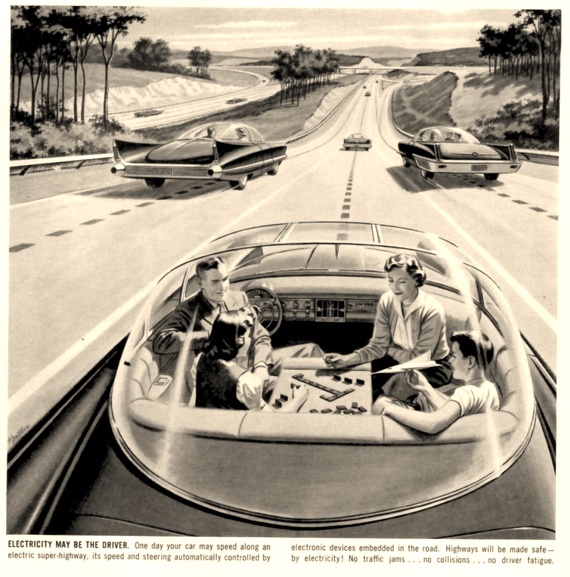O ano 2014, "visto" de 1964: tecnologia, distribuição e trabalho
Publicado9 Out 2014

Automóveis eléctricos existem, mas não permitem que o condutor jogue dominó durante a viagem, tornando a ideia projectada neste cartaz da America's Independent Electric Light and Power Companies uma miragem ainda futurista. Não é o caso de algumas das previsões do escritor Isaac Asimov, nascido na Rússia, naturalizado americano, e nome incontornável da ficção científica que em 1964, ano da New York World's Fair - que pretendeu mostrar ao mundo as mais inovadoras tecnologias da época - escreveu um artigo para o New York Times em que previa... o ano de 2014, colocando algumas das questões essenciais com que nos debatemos hoje em dia, globalmente.
Communications will become sight-sound and you will see as well as hear the person you telephone. The screen can be used not only to see the people you call but also for studying documents and photographs and reading passages from books. Synchronous satellites, hovering in space will make it possible for you to direct-dial any spot on earth, including the weather stations in Antarctica (shown in chill splendor as part of the '64 General Motors exhibit). (...)
Not all the world's population will enjoy the gadgety world of the future to the full. A larger portion than today will be deprived and although they may be better off, materially, than today, they will be further behind when compared with the advanced portions of the world. They will have moved backward, relatively.(...)
Indeed, the most somber speculation I can make about A.D. 2014 is that in a society of enforced leisure, the most glorious single word in the vocabulary will have become work! (...)
Isaac Assimov, Visit to the World's Fair of 2014
A Revista The Atlantic revisita esse texto e analisa o legado, em termos das mudanças climáticas, da evolução da tecnologia e da relação entre o homem e a natureza.
Asimov begins by suggesting that in the coming decades, the gulf between humans and "nature" will expand, driven by technological development. "One thought that occurs to me," he writes, "is that men will continue to withdraw from nature in order to create an environment that will suit them better. " (...)
But Asimov knows too that humans cannot survive on technology alone. Eight years before astronauts' Blue Marble image of Earth would reshape how humans thought about the planet, Asimov sees that humans need a healthy Earth, and he worries that an exploding human population (6.5 billion, he accurately extrapolated) will wear down our resources, creating massive inequality.
Asimov rightly saw the central role of the planet's environmental health to a society: No matter how technologically developed humanity becomes, there is no escaping our fundamental reliance on Earth (at least not until we seriously leave Earth, that is). But in 1964 the environmental specters that haunt us today—climate change and impending mass extinctions—were only just beginning to gain notice.
O texto completo, aqui
